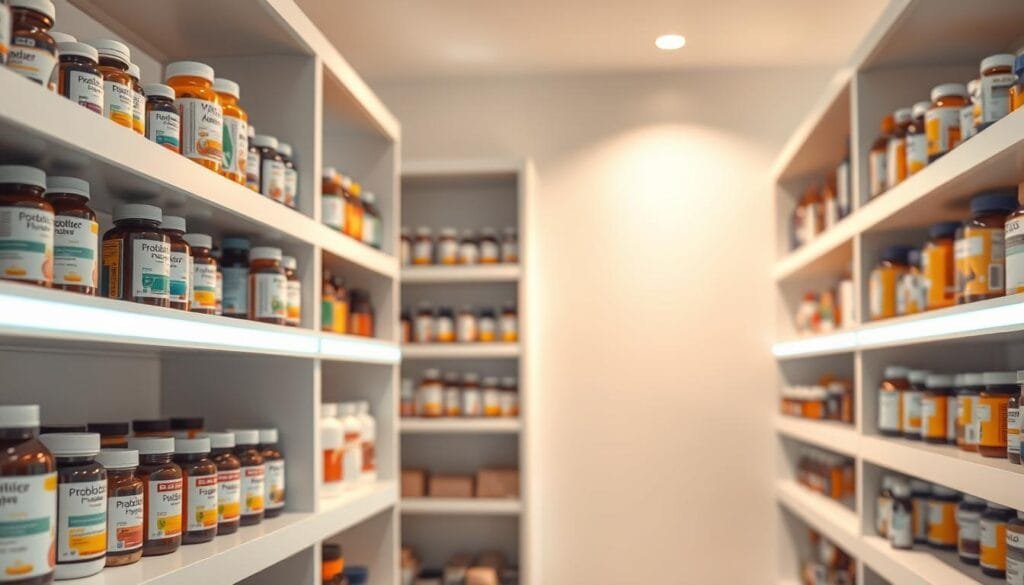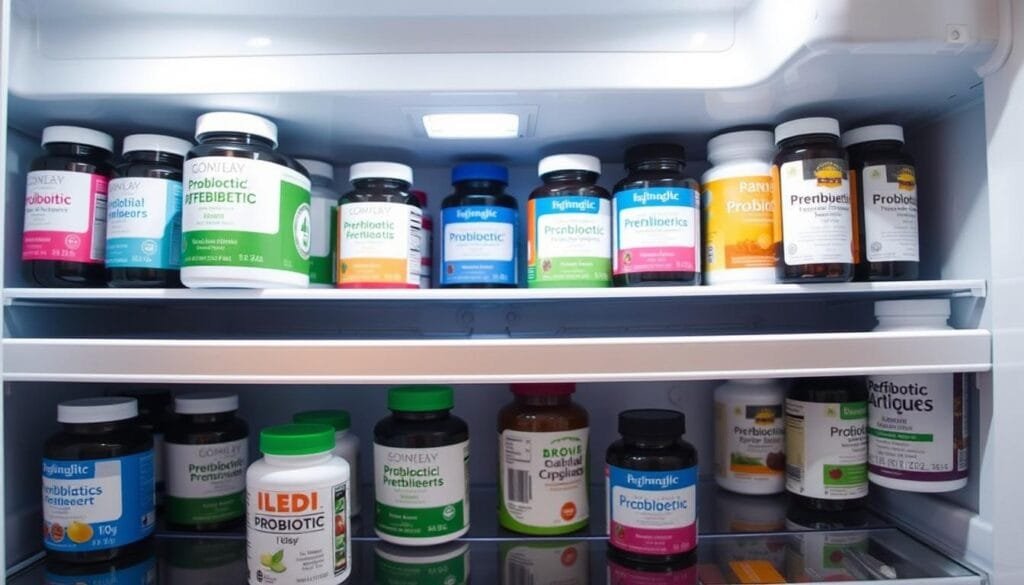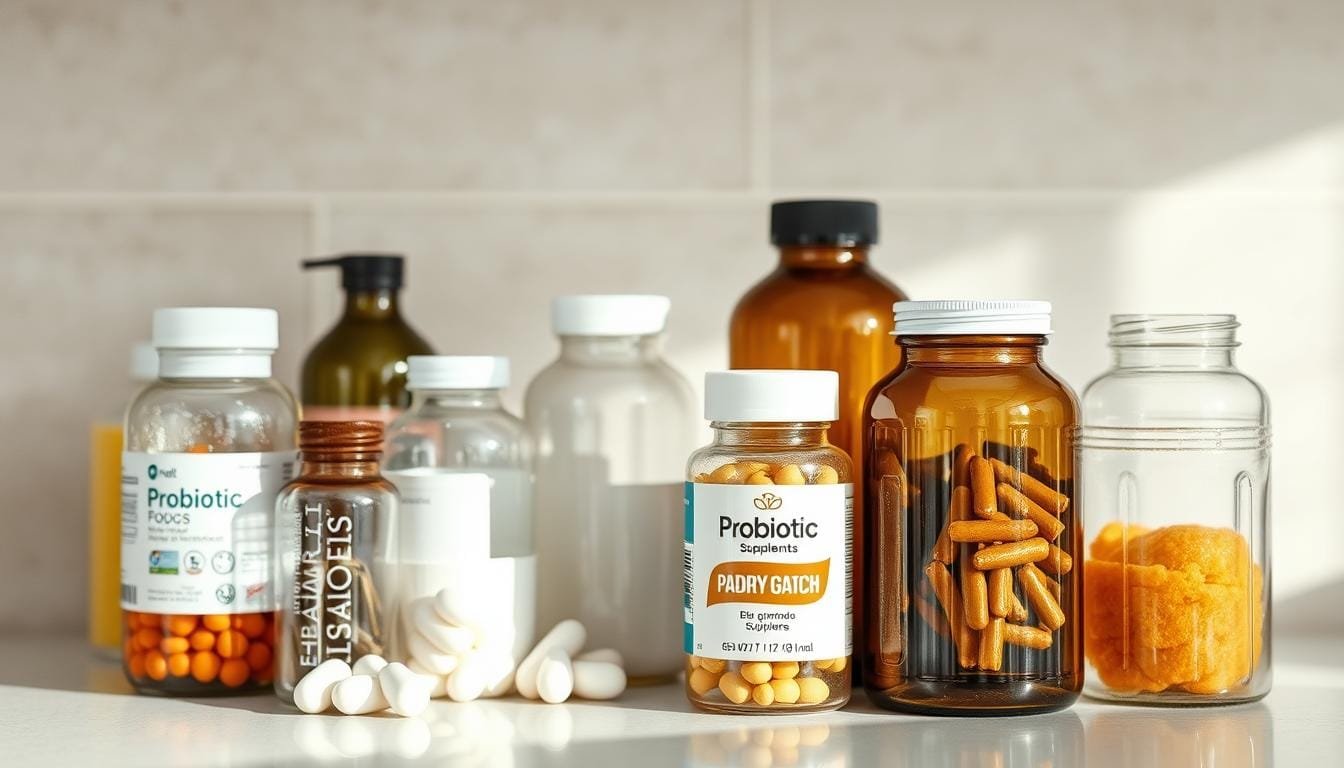Currently Empty: RM0.00
Surprising fact: up to half of live supplement strains may lose potency if stored in hot, humid conditions common in some Malaysian homes.
Probiotics are living microorganisms whose survival hinges on moisture, temperature, and pH. Some Bacillus strains show strong stability and withstand room heat, while yogurt and kefir must stay cold to avoid spoilage.
Modern supplements often use freeze-drying, encapsulation, and protective packaging to keep a product viable at ambient storage. Reading labels helps people pick the right product for daily use.
Wellness Concept offers friendly guidance in Malaysia. Contact via WhatsApp +60123822655 during business hours for tailored advice on storage and choosing the best option for gut health.
Key Takeaways
- Not all strains respond the same; storage affects potency and health benefits.
- Certain foods like yogurt must stay refrigerated to prevent spoilage.
- Some supplements are stabilized for shelf storage through modern manufacturing.
- Check labels and packaging claims for recommended storage conditions.
- Proper handling helps ensure live cultures reach the gut and support wellness.
Do probiotics need to be refrigerated?
How a product is processed and packaged often decides if cold storage is required. Some strains are fragile and lose count quickly in heat and humidity. Others are made hardy and can sit on a shelf at room temperature.

Why some strains are heat‑sensitive (and others last on the shelf)
Many Bifidobacterium and some Lactobacillus strains fare better when kept cool. High heat and moisture shorten shelf life by damaging cell membranes and reducing viable bacteria counts.
Bacillus species and select spore‑forming organisms withstand wider temperature swings and often arrive as shelf‑stable supplements.
Foods vs. supplements: when cold is non‑negotiable
Fermented foods such as yogurt and kefir must stay chilled to prevent spoilage. Live cultures in foods can also be killed by cooking or exposure above about 115°F, so refrigeration is essential for safety and benefit.
What manufacturers do to protect cultures
- Freeze‑drying places cells in a dormant state that survives some heat.
- Encapsulation and moisture‑barrier packaging shield organisms from water, oxygen, and stomach acid.
- Blister packs and sachets reduce loss each time a dose is taken, preserving counts through the stated shelf life.
Room temperature, cool, and cold explained
Ambient storage usually means controlled room temperature (20–25°C / 68–77°F). Cool storage is about 8–15°C, and refrigeration is 2–8°C. Limiting exposure to cooking steam, direct sunlight, and water helps all products keep potency for longer.
How to tell if your probiotic requires the fridge
Labels and shipping context reveal whether a supplement must stay chilled.
Start with the label. Look for clear storage instructions and a statement that CFUs are guaranteed to the end of shelf life. Also check the expiration date so the product is used while potency is highest.
Next, note how it was sold and shipped. Items from refrigerated displays or delivered with ice packs or thermal bags are usually temperature‑sensitive. Condensation or a “refrigerate after opening” note is a practical cue.

Simple checklist for quick decisions
- If the label says “keep refrigerated,” follow it.
- If the label promises CFUs to end of shelf life at room conditions, storing per instructions is safe.
- Keep capsules in original blister packs or sealed bottles to limit moisture and heat exposure.
- When in doubt, refrigerating is a conservative choice; do not freeze unless the brand allows it.
| Clue | What it means | Home action |
|---|---|---|
| Refrigerated display or ice pack | Product was kept cold in retail or transit | Place in fridge on arrival |
| Label: CFUs to end of shelf life | Manufacturer guarantees counts through expiration date | Store as stated; use before expiration date |
| “Keep in cool, dry place” | Shelf‑stable under controlled temperatures | Avoid heat and humidity; fridge optional |
For more guidance on choosing and storing probiotic supplements in Malaysian conditions, learn more about storage from Wellness Concept.
How to store probiotics for maximum potency in Malaysia’s climate
In Malaysia’s warm, humid climate, simple storage choices make a big difference for supplement effectiveness. Follow easy steps to protect live counts and ensure the benefits last through the product life.
Keep it cool and dry: avoid high temperatures, sunlight, and humidity
Store supplements in a cool cabinet away from windows, stoves, and steam. Aim for controlled room temperature (20–25°C / 68–77°F).
High heat and humidity accelerate degradation; excessive heat above 40°C (104°F) is especially damaging.
Packaging matters: blister packs, moisture‑barrier sachets, and tightly sealed caps
Keep products in original packaging. Moisture‑barrier sachets and blister packs limit water ingress and help maintain life.
At home and on the go: room‑temperature options vs. sensitive strains
Only use room temperature storage when the label says the product is shelf‑stable. For sensitive strains or items shipped cold, refrigeration (2–8°C) offers added protection.
Timing and handling: follow use‑by dates and minimize frequent opening
Take out one dose and reseal quickly. This reduces moisture exposure and extends useful life.
“A dry, stable spot and original packaging preserve potency much better than casual cupboard storage.”
- Avoid leaving blister packs in hot cars or direct sunlight.
- Do not store near freezer vents where condensation can form.
- Finish products before the use‑by date, especially in tropical conditions.
| Storage choice | When to use it | Key action |
|---|---|---|
| Cool, dry cabinet | Shelf‑stable probiotic supplements | Keep original packaging; avoid heat sources |
| Refrigeration (2–8°C) | Sensitive strains or cold‑shipped products | Place away from freezer vents; avoid freezing |
| Single‑dose sachets | Travel and hot days | Carry in insulated pouch; avoid car dashboards |
If unsure, message Wellness Concept on WhatsApp +60123822655 for tailored advice. Business hours: Mon–Fri 9:30 am–6:30 pm; Sat 10 am–5 pm; Sun Closed.
Conclusion
Picking the right storage path keeps the intended strains active through the product life.
Some supplements and fermented foods are shelf‑stable because manufacturers use freeze‑drying, encapsulation, and barrier packs. Many Bifidobacterium and certain dairy items such as yogurt still benefit from cold storage.
Follow the label and storage instructions for best results. In warm, humid Malaysian homes, refrigeration is a low‑risk step that helps protect bacteria from heat and moisture and extends shelf life.
For tailored advice on product selection or storage, message Wellness Concept on WhatsApp +60123822655. Business hours: Mon–Fri 9:30 am–6:30 pm; Sat 10 am–5 pm; Sun Closed.
FAQ
Do probiotic supplements have to stay cold?
Many live cultures are sensitive to heat and moisture, so some formulas carry a cold-chain recommendation. Others use shelf-stable strains and protective processing that keep potency at room temperature. Always follow the manufacturer’s storage instructions and check the expiration or “CFU to end of shelf life” statement.
Why are certain strains heat-sensitive while others remain stable?
Different microorganisms tolerate temperature and humidity variably. Lactobacillus and Bifidobacterium species often prefer cooler conditions, while specific spore-forming Bacillus strains resist heat better. Techniques such as freeze-drying and encapsulation also boost survival for room-temperature products.
Are refrigerated foods the same as supplements when it comes to storage?
No. Yogurt, kefir, and other fermented foods usually require refrigeration to preserve texture and live cultures. Some supplement capsules and sachets are formulated for ambient storage and can be kept outside the fridge if labeled that way.
What do manufacturers do to protect live cultures from heat and humidity?
Brands use methods such as freeze-drying, microencapsulation, moisture-barrier packaging, and oxygen absorbers. These measures extend shelf life and protect organisms during transport and storage, reducing the need for constant refrigeration.
What does “store at room temperature” actually mean?
“Room temperature” generally means a cool, dry place between about 59–77°F (15–25°C). Avoid direct sunlight, hot cars, and humid bathrooms. In hot climates, even labeled room-temperature products may perform better if kept in a cooler spot.
How can someone tell if a product should be refrigerated?
The label is the first clue: it will state storage instructions, recommended temperatures, CFU at manufacture and at end of shelf life, and an expiration date. Packaging that requires cold-chain shipping or mentions “keep refrigerated” must be chilled on arrival.
What purchase and shipping clues indicate refrigeration was needed?
Refrigerated displays, ice packs in delivery, insulated shipping boxes, and store coolers signal a cold-chain product. If a product arrives warm and the label required refrigeration, contact the retailer or manufacturer before use.
How should someone in Malaysia store live-culture supplements for best results?
Keep bottles in a cool, dry cabinet away from sunlight and heat sources. In Malaysia’s humid climate, a refrigerator can help sensitive strains retain potency. Avoid storing near the stove, oven, or windows where temperatures rise.
Does packaging make a big difference for stability?
Yes. Blister packs, sealed sachets, desiccants, and opaque bottles improve shelf life by blocking moisture, oxygen, and light. Choose products with robust packaging if regular refrigeration isn’t practical.
What if someone travels or needs to take supplements on the go?
For travel, pick shelf-stable formulations or use insulated pouches with ice packs for sensitive products. Minimize time out of recommended temperature ranges and reseal containers tightly after use.
How important is timing and careful handling at home?
Very important. Follow use-by dates, avoid leaving bottles open for long periods, and keep caps sealed. Frequent temperature swings and humidity exposure reduce viability faster than a single short heat event.
Who can provide personalized storage guidance in Malaysia?
For tailored advice, contact Wellness Concept on WhatsApp at +60123822655 (Mon-Fri 9:30 am–6:30 pm, Sat 10 am–5 pm, Sun Closed). They can recommend products and storage routines for local conditions.



